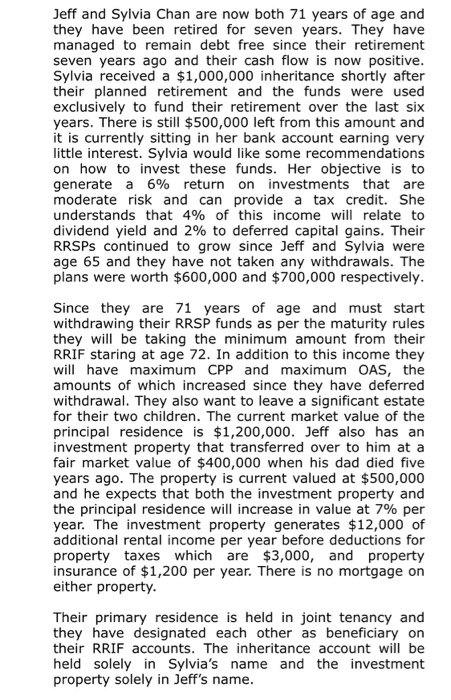Jeff and Sylvia Chan are now both 71 years of age and they have been retired for seven years. They have managed to remain debt free since their retirement seven years ago and their cash flow is now positive. Sylvia received a $1,000,000 inheritance shortly after their planned retirement and the funds were used exclusively to fund their retirement over the last six years. There is still $500,000 left from this amount and it is currently sitting in her bank account earning very little interest. Sylvia would like some recommendations on how to invest these funds. Her objective is to generate a 6% return on investments that are moderate risk and can provide a tax credit. She understands that 4% of this income will relate to dividend yield and 2% to deferred capital gains. Their RRSPs continued to grow since Jeff and Sylvia were age 65 and they have not taken any withdrawals. The plans were worth $600,000 and $700,000 respectively. Since they are 71 years of age and must start withdrawing their RRSP funds as per the maturity rules they will be taking the minimum amount from their RRIF staring at age 72. In addition to this income they will have maximum CPP and maximum OAS, the amounts of which increased since they have deferred withdrawal. They also want to leave a significant estate for their two children. The current market value of the principal residence is $1,200,000. Jeff also has an investment property that transferred over to him at a fair market value of $400,000 when his dad died five years ago. The property is current valued at $500,000 and he expects that both the investment property and the principal residence will increase in value at 7% per year. The investment property generates $12,000 of additional rental income per year before deductions for property taxes which are $3,000, and property insurance of $1,200 per year. There is no mortgage on either property. Their primary residence is held in joint tenancy and they have designated each other as beneficiary on their RRIF accounts. The inheritance account will be held solely in Sylvia's name and the investment property solely in Jeff's name. 7. What would be the best type of insurance to pay the estate taxes and probate fees above? (2 Marks) 8. If Sylvia invested her inheritance in term deposits earning 3% and she did not reinvest the interest income which is fully taxable, would there be any additional taxes owing on her death with Jeff being her survivor? (1) What about probate fees? (1)








